- Home
- Bette Lee Crosby
Passing Through Perfect
Passing Through Perfect Read online
PASSING
through
PERFECT
A Novel
BETTE LEE CROSBY
PASSING through PERFECT
Advance Reader Copy (ARC)
Copyright © 2014 by Bette Lee Crosby
Cover design: damonza.com
Formatting by Author E.M.S.
Editor: Ekta Garg
All rights reserved. No part of this publication may be reproduced or transmitted in any form by any means, electronic or mechanical, including photocopy, recording, or information storage and retrieval system without permission in writing from the author, except by reviewers who may quote brief passages for a review to be printed in a newspaper, magazine or journal.
This is a work of fiction. While, as in all fiction, the literary perceptions and insights are based on life experiences and conclusions drawn from research, all names, characters, places and specific instances are products of the author’s imagination and used fictitiously. No actual reference to any real person, living or dead, is intended or inferred.
ISBN-13: 978-0-9891289-7-1
BENT PINE PUBLISHING
Port Saint Lucie, FL
To
JoAnne Bliven
Because it is she who sees.
A Note From The Author
Then will the eyes of the blind be opened
and the ears of the deaf unstopped
NIV Isaiah 35:5
Writing a novel is never easy; writing a novel that explores the good and bad in people offers an even greater challenge and I could not have done it alone. Every day I thank Our Heavenly Father for blessing me with the ability to tell stories and giving me the courage to tell them as they should be told. Cruelty, profanity, and bigotry are an ugly but very real part of this world we live in. It is only by seeing this bitter side of truth that we can appreciate the goodness, generosity and love that surround us.
My inspiration for this story came from many sources, not the least of which was my Southern heritage. I have seen a South not unlike the one portrayed in this book. At the time, neither white nor black considered these actions cruel; they simply were what they were. Separate but equal, they said. Yet the truth is that although it was separate, it was far from equal.
Poverty is colorblind. In the first half of the twentieth century there were many areas of the South where poverty-stricken whites lived alongside blacks. There were no race riots, no boycotts, no huge outcry; there was only poverty. Although both families struggled to put food on the table and children all too often went to bed hungry, the white man held his head just a little bit higher because he was white.
They say that Divine Providence often steers our footsteps, and I believe this is true. As I was working on this novel, I came across President Jimmy Carter’s memoir An Hour Before Daylight, and it provided a great source of inspiration. Reading this memoir reminded me of the tales my mother once told. Not tales of good or bad, simply tales of what was.
I hope you enjoy reading this story of a time gone by. Some will call it the “good old days,” and others will disagree. As for me, I simply hope you can see beyond the evils men do and find the goodness of God’s grace.
PASSING
through
PERFECT
Benjamin Church
1958
When the heart of a man gets pulled loose he starts dying. I started dying a year ago, and I’m still working on it. I ain’t going all at once; I’m going piece by piece. If you was to see me pushing the plow or chopping wood, you’d figure me a whole person—a heaving, hauling, hard of muscle and stinking of sweat man. But the truth is I ain’t been whole since this same day last year.
It ain’t my skin and bones what’s dying, it’s my soul. My body’s still walking around doing chores and taking orders from folks like Missus Mayfield, but my soul…that’s lying out on Cross Corner Road alongside Delia.
In the year gone by I suffered more misery than God ought to expect a man to bear. Now I come to where I can’t take no more. It ain’t easy leaving a place where you was born, but I got Isaac to think of and the boy deserves better. I ain’t gonna say if this is a good decision or not, but come tomorrow morning Isaac and me is leaving here and we ain’t never gonna look back at Alabama.
This is a place of shame and misery. The shame of a man called boy and the misery of losing what you love. ’Course to understand the size of my misery, you’d have to know how it was with me and Delia.
Grinder’s Corner, Alabama
1946
The war was over, and hundreds of thousands of young men headed home to pick up the pieces of their lives. Benjamin Church was one of them. Many came home missing an eye, an arm, or a leg, but not Benjamin. Although he’d joined up thinking he’d fight Germans, the truth was he’d done little more than unload trucks and work on the motors that kept them running.
In the years he’d been gone Benjamin had sent countless letters home. His mama had written back several times saying things at home were just fine. But after the fall of that third year, he’d received only one letter telling how his mama had gone to be with the Lord. The letter was penned in Reverend Beech’s neat, even script, but at the bottom in shaky block letters his daddy had written OTIS CHURCH. They were the only two words Otis could write.
Benjamin climbed down from the bus in Bakerstown, slung his duffle bag over his shoulder, and started walking. It was almost twenty-five miles out to the farm and most of it back road. On the far edge of Madison Street he veered toward Pineville Road and left the town behind.
On the long nights when he’d lain in his bunk thinking of home, Benjamin had remembered raucous rolls of laughter and the smell of pork roasting over a wood fire. He saw girls in flowery dresses and called to mind the sound of their high-pitched giggles. Of course, it had been four years so he expected to see some change: a few new houses maybe, a new store, a cement road. But there was nothing. It was exactly the same as when he left. In a strange way, the sight of sameness felt comfortable. It was the part of home he’d longed for.
The sun was low in the sky when the house came into view. It sat there silent as a graveyard; no motors chugging, no people talking, not even a barnyard chicken squawking. For a brief moment Benjamin wondered if his daddy was gone also, but when he turned into the road the old man came out onto the porch.
Benjamin raised his arm and waved. Otis brought his hand to his face and shielded his eyes from the sun. He leaned forward, trying to identify the stranger.
Dropping his duffle in the road, Benjamin took off running. He was three steps shy of the porch when his daddy finally recognized him.
Otis gasped. “Lord-a-mercy, I hardly knowed it was you.”
Benjamin hugged the frail Otis to his chest and laughed. “You saying I put on some weight?”
“Some weight?” Otis echoed. “Why, you done went from boy to man.”
It was true. Benjamin had left home a lanky, bone-thin boy and returned a man who was broad of chest and heavily muscled. His face had also changed. It wasn’t a change you could point to and say his nose was shorter or his cheeks fuller; it was the look behind his eyes. They were still brown with scattered flecks of gold, but there was a wisdom that hadn’t been there before. If you looked only at Benjamin’s eyes, you could almost believe him to be an old man.
“I’m sorry about your mama,” Otis said.
A look of sadness shadowed Benjamin’s face. “I’m sorry too, Daddy. Real sorry.”
He said nothing of how for nearly a month his mama’s laugh was something he couldn’t forget. No matter how hard he tried not to think of her, the thoughts came and he cried. There were nights when he’d fall into his bunk exhausted from the day’s
work, but the moment he closed his eyes a picture of her came to mind. He’d see her baking a pie, drawing water from the well, or singing in the choir, and knowing she was gone would sting like a hornet nesting inside his brain.
After a short time of talking Benjamin went back, picked up his duffle, and came inside the house. It was the same as the day he’d left. His mama’s apron still hung on a peg alongside the wood stove. As he sat at the kitchen table and drank a glass of sweet tea with his daddy, her ghost slid in alongside of them. It was a sadness neither of them wanted to speak of. In time they would talk of it, but not now.
Searching for a less painful topic of conversation, Benjamin asked, “How come the cornfield’s not planted?”
“It’s planted,” Otis answered in the flat dry way he had of speaking.
“Less than half,” Benjamin said. “The back lot don’t even look plowed.”
“It ain’t. No sense in plowing what I ain’t planting.”
Benjamin looked at his daddy. “You’re not planting the back lot?”
“Nope.” Otis shook his head.
“How come?”
“I run short.”
“Short of what?”
“Short of seed money, short of time.” Otis gave a heavy sigh. “Short of…”
He let the rest of what he was thinking drift off without being said. Fingering a threadbare spot in his pants for a good half minute he added, “Anyways, Henry’s too old to be pulling a plow. That mule done worked way past his years.”
“Mister Sylvester ain’t gonna be none too happy if you give him half what he’s expecting.”
“He ain’t gonna be happy no way. Long as I been on this earth, I never seen that man smile. Not once.” Otis gave his head a worrisome shake. “A body like him’s got everything to be glad about, and he ain’t glad about nothing. Seems God ought to give second thought to how He’s handing out blessings.”
Benjamin knew what his daddy said about Sylvester Crane was true. The man owned every square inch of farmland in Grinder’s Corner and collected one fourth of every nickel the sharecroppers earned. He also owned the gristmill, so there was no getting around him.
“You remember what happened to Widow Palmer?” Benjamin asked. It was more challenge than question.
“Yeah, I remember,” Otis grumbled.
“Well, then.”
“I was figuring to give Mister Sylvester most a’ what come in. That ought t’ satisfy his greedy soul.”
“That ain’t no answer,” Benjamin said. “You give him everything, then what you got to live on?”
“The Bible says the Lord provides.”
“Yeah, well, it don’t say He’s gonna show up and plow that back lot. He’s maybe gonna give you sun and rain, but getting those seeds in the ground is up to you.”
Although his daddy didn’t have anything more to say, the truth of the matter was obvious. It wasn’t the seed money or the old mule; without Lila, Otis had lost the will to live. A man who’d reached that point had to be cared for, and Benjamin knew the responsibility now fell on his shoulders. He was their only child; there was no one else.
He’d returned home thinking Grinder’s Corner might have changed, that there might be a few new businesses, that perhaps acceptance had blossomed into hope, but looking at Otis he could now see the future looked a lot like the past. He measured the reality of that thought against a lifetime of loving his daddy and against a heart that still ached to hear his mama’s voice. His own dreams seemed pitifully small by comparison.
After only a few moments, he decided the love in his heart outweighed whatever plans he had made in his years away from home. Setting aside thoughts of one day being a mechanic, Benjamin knew he would be what he was destined to be: a farmer. It was their way of life. He would follow in the footsteps of his daddy and his granddaddy. In time he would grow to be rooted to the earth as Otis now was.
The next morning Benjamin hitched Henry to a wagon that was older than the mule and headed for town. With the mustering out pay in his pocket and what he’d saved during the past years, he bought enough silver corn seed to plant the back lot and paid fifteen dollars for a 1930 Model A Ford that couldn’t cough up enough energy to start.
“That’s okay,” Benjamin said. “I been taught to fix motors. Sooner or later I’ll get her going.”
It was later.
He tied the old car to the back of the wagon, and Henry pulled it home.
It was the hottest summer Alabama had seen in more than a decade yet every day, even Sundays, Benjamin was out there working in the field. He worked until a river of sweat rolled down his face and stung his eyes. When that happened he’d stop long enough to wipe his face and gulp down a few swigs of water; then he’d go right back to work. He pushed and Henry pulled the plow until little by little spaced out furrows began to appear. Then walking side by side with his daddy, they dropped in the seeds that would in a few months be a waving field of corn.
Otis’s steps were slow and his back hunched even when he wasn’t carrying a bag of seed. Benjamin saw this and put less than a third of what he carried in his daddy’s bag. He knew that doing it alone he could have finished the job sooner, but sharing the work was a way of giving his daddy reason for living.
Before the end of April the back lot was filled with sprouts of green coming from the ground, and by mid-June those shoots were knee-high.
“It’s gonna be a good year,” Otis said, but a week later a dry spell started up.
For the first few days, Benjamin and his daddy paid little attention. In the evening they sat on the front porch and waited for the cool breezes that generally followed a rainstorm, but none came. By nightfall the house was so stifling that Benjamin stripped off his clothes and lay naked across the bed. Even lying still as a dead man, beads of sweat rose up on his face and his back stuck to the sheet.
Otis didn’t even bother going to bed. He sat in the rocking chair on the porch and creaked back and forth until sometime in the wee hours of morning when his eyes finally fell shut.
After nine days of blistering sun and not a drop of rain, the leaves on the newly-planted corn began to droop.
“Dammit, Daddy,” Benjamin said, “when’s it gonna rain?”
Sitting on the porch waving a piece of cardboard back and forth in front of his face, Otis shrugged. “Could be today, could be tomorrow. We got no way of knowing.”
Benjamin looked up at the sky. It was a hazy blue, the kind of color that gave no indication of either rain or sun. In the distance there was a scattering of clouds but they drifted lazily, moving off towards Tennessee.
“I’m gonna take a look at how them plants is doing,” he said, then left Otis sitting on the porch and headed for the back cornfield.
Several stalks had already toppled over. The ground, now dry as dust, wasn’t enough to hold on to them. Benjamin walked up one row and down the other. They were all the same, most of the stalks still standing, but another day without water and they too would fall. He straightened a few plants then bent and tried to pack the dirt around them, but grains of sandy earth rolled through his fingers and fell away. Without rain the entire crop would be gone in a day, two at the most.
That afternoon Benjamin began drawing buckets of water from the well and carrying them to the back lot cornfield. He worked throughout the day, stopping only long enough to splash water on his face and drink from the canteen he kept sitting on the porch. After a dozen trips back and forth Otis began helping, but before he’d finished a single run the old man’s face turned ashen grey and he began gasping for air.
Benjamin grabbed hold of the bucket Otis was carrying. “You trying to kill your fool self? Go sit down, Daddy, this ain’t work you need to be doing.”
Otis protested, saying he was perfectly capable of doing a man’s work. But after a second trip with a half-full bucket, he plopped down on the porch step.
“It ain’t right for a young’un to be doing his daddy’s work,” he said so
rrowfully.
Benjamin laughed. “I ain’t a young’un no more. I’m a full-growed man.”
“Don’t go getting cocky,” Otis replied. “You ain’t never gonna be too growed for listening to your daddy.”
“Yes, sir!” Benjamin smiled and saluted Otis the way he would a senior officer. He eased down beside his daddy and looped a long arm over the old man’s shoulder. For several minutes he sat there trying to think of the right thing to say, the thing that would make Otis feel better. The thing that would give back what he was missing.
Unfortunately time is the master of us all; it takes what it will, and often there are no words to ease the emptiness of what is gone. They sat in silence for a long while, and Benjamin thought back to the days when their roles had been reversed. Otis was muscular and strong, capable of packing a day-and-a-half’s worth of work into a single day. Benjamin, a boy, trailed behind with a sack of seed not half the weight of his daddy’s. He could almost hear his own voice asking for a heavier bag, and Otis saying he was too young for such a load.
His daddy had laughed. “In time. When I’m an old man, you’ll have to carry my weight along with your own.”
As a boy Benjamin couldn’t envision the possibility of such a thing. Back then he’d seen his daddy and mama as two towers of strength, forces so powerful they woke the sun in the morning and pulled the moon into place at night. They’d been the makers of his world; now he struggled to be half what they’d been. Coming to grips with the thought that he could one day be walking in Otis’ shoes, Benjamin gave a heartfelt sigh. He stood, went to the well, drew a bucket of icy cold water, and handed a cupful to Otis.

 Emily, Gone
Emily, Gone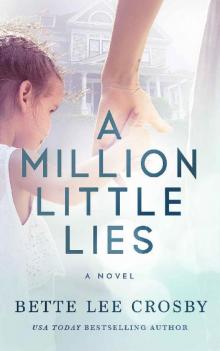 A Million Little Lies
A Million Little Lies Previously Loved Treasures
Previously Loved Treasures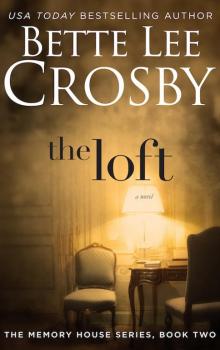 The Loft
The Loft Spare Change
Spare Change Memory House: Memory House Collection (Memory House Series Book 1)
Memory House: Memory House Collection (Memory House Series Book 1) Silver Threads
Silver Threads Wishing for Wonderful: The Serendipity Series, Book 3
Wishing for Wonderful: The Serendipity Series, Book 3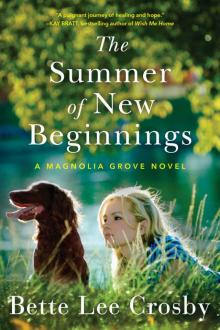 The Summer of New Beginnings: A Magnolia Grove Novel
The Summer of New Beginnings: A Magnolia Grove Novel The Regrets of Cyrus Dodd
The Regrets of Cyrus Dodd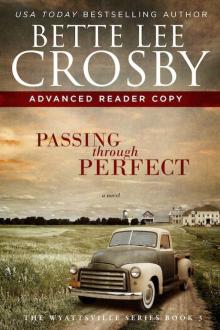 Passing Through Perfect
Passing Through Perfect Baby Girl
Baby Girl Jubilee's Journey
Jubilee's Journey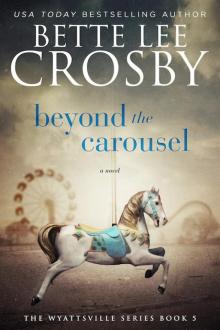 Beyond the Carousel
Beyond the Carousel What the Heart Remembers
What the Heart Remembers Cupid's Christmas
Cupid's Christmas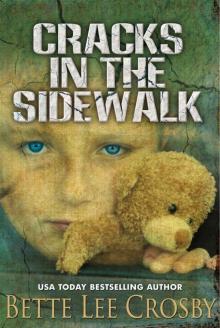 Cracks in the Sidewalk
Cracks in the Sidewalk Blueberry Hill
Blueberry Hill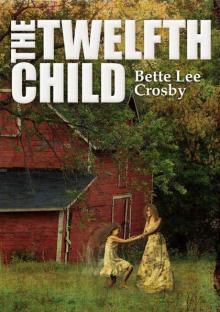 The Twelfth Child
The Twelfth Child A Year of Extraordinary Moments (A Magnolia Grove Novel)
A Year of Extraordinary Moments (A Magnolia Grove Novel)